 print preview
print previewback ETHEL ANDERSON
from Under the Red Cross Flag at Home and Abroad
A diary and scrapbook of Base Hospital Unit #44, Evacuation Hospital #5
August 1, 1918—La Havre, France
Three thousand miles or more now separate us from friends and home, and looking out of the window over the strange roofs of houses, and down along the narrow street, we gain our first impressions of a seaport town of France.
It seemed but yesterday that we were billeted in the Judson Hotel in the city of New York. What with the drilling at the armory, French classes, and getting together necessary equipment for overseas, the few weeks spent in New York were busy ones, but long to be remembered.
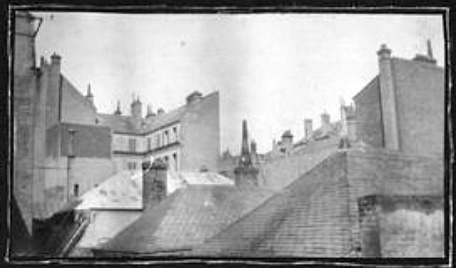 |
| Rooftops of La Havre, France. |
On Saturday afternoon, July 13th, orders were issued forbidding any member of the Base Hospital Unit #44 to leave the hotel, send letters, or communicate in any way with [anyone] other than members of their own unit. It was not hard to guess what this meant, and a feeling of great expectation came over all.
An early comer at the hotel on Sunday morning would have been obliged to step gingerly over rows of suitcases in order to reach the desk; for there were over one hundred waiting to be loaded on an army truck and carried to the station. In groups often the owners of these suitcases left the hotel, and left some by elevated, others by bus, still others by trolley car, all bound for the Pennsylvania Station, and from there—where?
How eagerly we watched to see a familiar sign, which might satisfy our curiosity as to what direction we were going. Toward noon we realized where we were bound for, and as the train entered the docks, crowds of anxious civilians greeted us, but they were waiting for familiar faces of khaki clad boys, and when the train filled with women in blue greeted them a cry of [the] disappointed arose on all sides, but one kind old lady with a gentle motherly face smiled pleasantly and shouted “Take good care of them and send them back to us.” These few words of encouragement helped out a good deal and I know many were determined that all previous training would be put to its best test to restore back to health and home, any “mother’s son” who might be given to our keeping.
As we filed down from the train to the wharf, the music from the regimental band of the 310 F.A. greeted us, and shouts of welcome from the personnel of that outfit. How cheerful and enthusiastic everyone felt as they boarded the transport and the strains of “Over There” seemed to cheer them on.
Just as the hands of the clock pointed to the hour of half past three on that Sunday afternoon of July 14th, amid cheers and shouts of its occupants, the good ship Northland slowly but surely left its dock, and leaving the city of Philadelphia, it cruised down the Delaware River. How eager we were to catch every glimpse of land before night should fall and shut it from view.
Traveling in wartimes on an army transport is certainly a novel and not too pleasant sensation. Having been assigned to lifeboats and given life belts, and instructed as to rules about lights, etc., the afternoon was well spent, and as the evening approached many gathered below in the dining salon where a short religious service was held. The words of the old familiar hymns were sung as if a prayer:
As a mother stills her child
Thou cans’t hush the ocean wild.
Wondrous Sovereign of the sea,
Jesus Savior, pilot me.
How well I remember that little service and how many times the words of the quotation of Mrs. Hegeman’s came before me and seemed to fit with the occasion and mission upon which we were sent. “If therefore, there is any kindness I can show, or any good I can do to any fellow being, let me do it now, let me not defer it, for I shall not pass this way again.”
The next morning found us out of sight of land, but on the following morning we were awakened by sounds of hurrying feet on deck and the slow motion of the boat as if she were about to drop anchor. Joining the throng on deck we saw to our surprise the devastated portion of Halifax which had been so recently destroyed. We stayed in the harbor for two days. There were several other camouflaged transports in the harbor and visitations between these boats were soon underway. Looking out of the porthole one of our daring number chanced a snapshot at some of these boats.
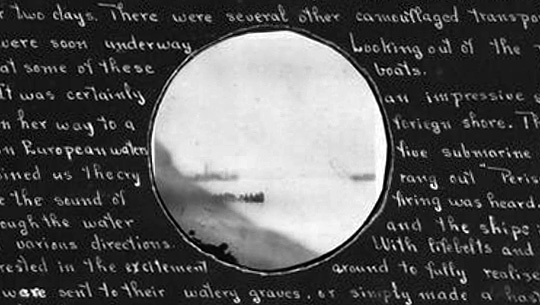 |
| Camouflaged transports photographed through a porthole. |
It was certainly an impressive sight as the convoy of twenty-four ships left the harbor on her way to a foreign shore. The trip was uneventful until five days from shore [when] in European waters five submarine chasers joined the convoy. The second day after they joined us the cry ran out “Periscope starboard beam!” In less time than it takes to write the sound of firing was heard. Depth bombs were fired. The chasers were shooting through the water and the ships immediately changed their course and all scattered in various directions. With lifebelts and in boat position we awaited further developments, too much interested in the excitement around to fully realize the danger that threatened. Whether or not the enemy were sent to their watery graves, or simply made a hasty exit, I could not say for certain, but we were not molested again.
That night all hands stayed up on deck. In the early morning hours, the faint outline of a dirigible could be seen approaching the convoy. The siren sounded and all were ready at the lifeboats, but as she drew nearer the flash of her signal sent a friendly feeling over all, and we watched her with interest as she scouted among the ships and the back to shore.
The next evening found us leaving the ship at Liverpool, England, and boarding the train for South Hampton. Greetings from King George were greatly appreciated.
As no lights were allowed on the train, we watched with interest the fading outline of the village, of dear old picturesque England, and when all was dark we saw the many searchlights flashing in the sky. . . .
August 27, 1918—Villers Cotteréts
When we left Chateau Thierry yesterday, when we started our uniforms were dark blue, but when we arrived here they were dusty gray from the ride over the road. They dumped us in a wheat field which has recently been cut, and here we waited until the tents began to go up and we could start to settle things.
This must be a lovely little town in peacetime. There are miles of trees, and one noticeable thing about these woods is the way the underbrush and debris is kept clear, you can walk for miles through paths in these woods. This town is noted for the birthplace of Alexander Dumas. There is a statue of him in town, and in the little grave yard is a tablet erected to his memory.
The camp is on the main road to Saissons, and there is a constant passing of troops and supplies day and night.
August 28, 1918
The boys went over the top at 5 a.m. and the barrage has been terrible. There are a number of large balloons in the woods across the road. These are used to trap the airplanes and these planes have been making frequent visits lately. These balloons look like huge elephants with big floppy ears, slowly rising from the ground. When these go up it always means trouble and sure enough Fritz came over last night and bombed the town, killed several civilians. There was nothing for us to do but lie in bed and shiver waiting results. Six searchlights were playing about in the sky in search of the plane. If you ever have heard the motor of a German plane you are not apt to forget the sound in a hurry, neither the sound of a bomb whizzing through the air. This morning we picked up pieces of shrapnel in the camp ground.
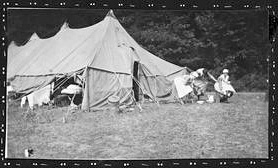 |
| Each tent is occupied by twenty nurses. |
September 1, 1918
It might be well to give a brief description of the duties of an evacuation hospital. These hospitals and personnel follow in back of a field hospital and follow certain divisions while in action. The hospitals move either by truck or train—equipment and personnel together. As soon as they arrive at their destination each boy is put on some detail and soon tents seem to spring up all over camp. Care is taken that tents are heavily camouflaged to prevent a ray from flashlight or candle to become visible outside the tent.
Our experience has been that patients arrive a short time after camp is set up. These patients are for the greater number operative cases. They are taken from the ambulances into [a] large tent called Receiving Ward, where a record of each case is made out. From the Receiving Ward he is carried into Pre-operative Ward, where cases to be x-rayed are sorted out, and seriously wounded are rushed into operating-room first.
All x-ray work is done by fluoroscopy, and all foreign bodies easily located by means of a blue pencil cross. Thus when the surgeon looks at [a] patient's record he may see Foreign body 3c.m. deep under mark x, etc., and if he follows [the] course pointed out he usually finds the foreign body without much trouble.
If you were an onlooker during a drive, you would find an evacuation hospital a busy place, ambulances bringing in the wounded night and day; Receiving Ward and Pre-operative Ward filled to overflowing with litter cases waiting their turn for relief.
 |
| Ambulance company attached to Evacuation Hospital #5. |
We hear the Sgt. call out “One out and one in.” And from the other end of the tent is a litter being carried to the ward, while at the other end another lad is brought into the table.
A glimpse of this room, where all are working with swift skilled hands, sends a thrill of excitement over one, especially if this be your work. Ten operating tables with surgeons, assistants, etherizers, and scrub nurse, scout nurses and orderlies, all working together like clockwork. There is someone to keep fires going, another to carry numberless pails of water and empty the waste, another to keep instruments clean. Someone must do up supplies, gowns, towels, sponges, etc. and keep them sterile by means of little field sterilizers. All these and countless other things must be done to save every one precious life and no time must be lost while relieving shifts.
If patients leave the operating room in condition of shock, he is taken to a ward where special treatment is given. Other cases are sent two hundred at a time on hospital trains to base hospitals as soon as possible. Ward nurses must see that patients are equipped for journeys, as well as many other countless duties.
During one drive eight hundred cases passed through the operating room in about three weeks. These included amputation, sucking chest wound, abdominal wounds, eye extractions, jaw wound, head cases where trephining was necessary, and many smaller cases where pieces of shrapnel and machine gun bullets were removed from the soft tissue, also gas-infected wounds.
. . . . . . . . . . . . . . .
Our own boys of this hospital surely deserve some credit for we seldom hear much said about the Medical Corp, but to follow them around awhile we would find not many moments are spent in idle play while work is at hand. The litter bearers especially deserve great credit. We who know you appreciate your work and the willing hand you always give the women of your hospital. From poor little Bridge with his cootie shirt to Top Sgt. Robinson with his feather puttee, we love them all. When the war is over they will all be scattered, some to the wild west, others to the valleys of the south, and still others to the east, and as office, factory, and plough will claim each one in turn, may you, during your busy hours, look back with happy, pleasant thoughts to the hard, sometimes unpleasant tasks, and don’t forget if we win this it was “Iodine and CC Pills” that helped.
September 14, 1918—Souilly, France
Well here we are with the old crowd from E.H.#7 also E.H.#6. We arrived here yesterday after traveling a day and night on a troop train. I wonder what folks at home would think if they could see us traveling. We hung around all day waiting for them to load the train. It doesn’t take as long to pack up our belongings, and as we looked back at the old campground as the last truck bumped out of the field, the old wheat field really looked forsaken.
It is tiresome, but surely a novelty to ride with the whole hospital on one train. Eight nurses ride in one compartment, the Beantown bunch usually manages to get together, and we are always prepared for emergencies. One carries a pail of water, one blankets, another a basket with extra goodies to eat such as grapes, figs, cheese, etc., purchased at the little villages. Then with trench coats, suitcases, and the bags slung over our shoulders with toilet articles, socks, etc., we board the train and wait for it to start.
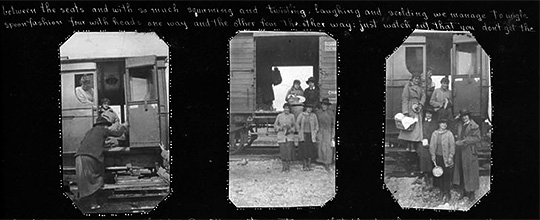 |
| Red Cross nurses, evacuation hospital #5. |
Down the track comes Sgt. Hasseau with his R.P. detail singing. To the tune of “Don't Bite the Hand That’s Feeding You.”
If you don’t like your beans and hardtack—under the seat goes a loaf of bread and can of beans for each one.
If you don’t like your slumgullion stew,
No matter where you eat, the table’s always neat—a can of goldfish and bully beef this time,
There no kick acoming from you.
If you don’t like your thirty monthly
And you're sore at the mess sergeant too—with a vengeance a can of tomatoes and jam,
Just remember my boys, it’s not Mother.
It’s Uncle Sam that’s feeding you.
A rattle of mess kits, opening of cans, and heating the contents over a sterno-flame, and “dinner” is served; and rattle of kits and splash of water out of the window and dishes are washed.
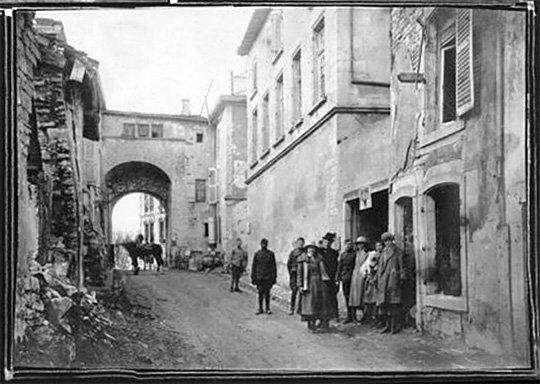 |
| Verdun—inside of entrance to the fort showing YMCA. |
It was about dusk as the “tin” whistle of the engine tooted and we had started on another mysterious journey. As the train rounded the curve from the “parlor cars” ahead marked 10 Hommes and 8 Cheveaux, we could see the boys waving back to us. The old laundry wagon loomed up like some mysterious object on the flat car. We stop at a siding near a station and from every car along the train will jump a group of curious Americans eager to stretch a bit and take in the sights, but it is not safe to wander far, for almost without warning the trains starts up once more, and then what a running and jumping. It just makes you hold your breath until the last one is safely on.
As it grew too dark to see out of doors and as no lights were allowed on the train, we amused ourselves by storytelling and singing, and then—oh memories—those nights. With suitcases on the floor between the seats and with so much squirming and twisting, laughing and scolding, we manage to wiggle spoon fashion four with heads one way and the other four the other way: just watch out that you don’t get the other fellow’s toes down your throat. Sometimes it is just as comfortable to sleep sitting up in the corner, especially after your neck has suffered a few kicks. Sleep—oh yes after you were assured that every wheel on the train wasn’t directly under your compartment, and the steady grind they made soon added to the joys of life. As long as the train kept on a steady move, it was fairly warm, but when it stopped, which seemed to be every five minutes, my but it was cold, and hearing an unusual amount of foreign talk, we would look out and find we were at some railroad station. We were at Paris about midnight, but only for a few seconds.
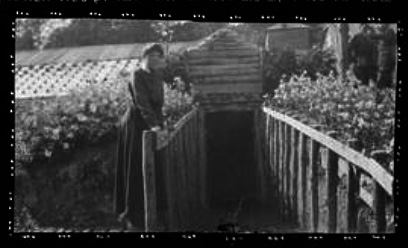 |
| Nurse (perhaps Ethel Anderson) outside of camouflaged bunkers near Verdun. |
So this afternoon the train pulled in alongside of a French hospital on a hillside. This is now occupied by Evacuation Hospital 6 & 7. They dumped us into the barracks and our men have gone on further and will send for us later.
The dugouts are very prettily camouflaged as well with vines and flowers growing around them.
This town is not far from Verdun where at the present time the entertainment of sightseers is best found elsewhere.
September 17, 1918
The crowd visited Bar-le-duc. We arrived home in the wee small hours and crept noiseless by into bed. Then the next day Maud and Emma set out AWOL and went again.
Today we have been sitting on the hillside watching the airplanes. So many are going over in battle formation. We watched them drive several German planes high up in the sky and for some distance the aircraft guns were firing at them. They went so high that although it has been a clear day it was impossible to see them.
September 18, 1918—Ville-Sur-Goursances, France
We joined our men late last evening. Some of our crowd were AWOL overnight. They left camp in the afternoon and when they came home found we had all left. We tried to hold back as long as we could but it was no use.
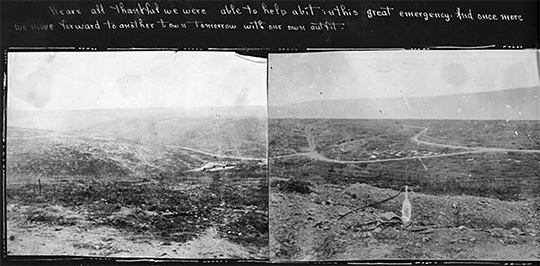 |
| Hole Trenches, barbed wire, and shell holes filled with water. |
We are in a little village not far from the Argonne. Troops are passing all the time. Our hospital is being held in reserve. There are many airplanes going over, and for this reason we are not allowed to stand out of doors in groups or wear any white on our uniforms. Things look suspicious.
September 19, 1918—Vaubecourt, France
It rained as usual. We played cards and fussed around and tonight ten of us were separated and sent to Evacuation Hospital #9 at Vaubecourt. I won’t mention our farewell, it is too sad to think of.
This hospital is just starting to operate and their own nurses have not joined them. I wonder what ten of us can do!
September 25, 1918
This past week has been dreadful. How little ten people could do caring for 1,400 boys wounded and medical cases. Influenza has been playing mischief. The poor boys have been walking into the hospital and are cyanotic when they come, and although everything is done for them, many have gone “West.”
No matter how many times, or whether night or day, the Receiving Ward is full of boys waiting their turn to be treated or given a place so sleep. The Red Cross workers have been so good to the boys. They have given them warm drinks while they are waiting and someone goes down to the train and gives them a drink and what comforts they can before they leave for the Base Hospital.
 |
| Seven nurses of Evacuation Hospital #5; Ethel Anderson, author of the scrapbook and diary from which these materials are taken, is pictured far right. |
Only two night nurses on duty and these women deserve some credit for the way they worked, for although it was impossible to give all the little comforts they would like to have given, they were always near to help and ease those who were leaving and going “West.” I, for one, shall never forget these nurses who worked without a murmur. In fact, everyone worked with a vengeance at what has been one of the worst drives of the year, the Meuse-Argonne.
And tonight we were recalled to our own outfit and others will join #9 tomorrow. When we came back we found that ten other nurses had been sent to Evacuation Hospital #10, and had found conditions much the same.
We are all thankful we were able to help a bit in this great emergency. And once more we move forward to another town tomorrow with our own outfit. ![]()
Ethel Anderson’s text and photos are sourced from The New York Public Library Digital Collections. Spelling and punctuation have been regularized in this transcription to help with readability and clarity. —Blackbird editors